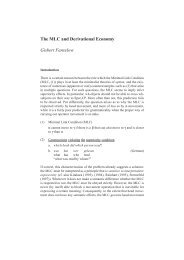Differential subject marking in Polish: The case of Genitive vs ...
Differential subject marking in Polish: The case of Genitive vs ...
Differential subject marking in Polish: The case of Genitive vs ...
You also want an ePaper? Increase the reach of your titles
YUMPU automatically turns print PDFs into web optimized ePapers that Google loves.
(45) a. * Byto na przyjeciu.<br />
to-was at party<br />
b. � Bywano na przyjeciach.<br />
no-wasHABIT at parties<br />
‘<strong>The</strong>y were at parties./<strong>The</strong>y used to be at parties.’<br />
This would mean that bywac <strong>in</strong>deed has properties <strong>of</strong> an unergative verb. Note, however, that<br />
there is someth<strong>in</strong>g special about the iterative/habitual <strong>in</strong>terpretation; cf. (46) <strong>vs</strong>. (44c). Example<br />
(46) actually shows that if an unaccusative verb has an iterative or a habitual read<strong>in</strong>g, it is <strong>in</strong> fact<br />
possible to build a -no/-to form from it. This seems to <strong>in</strong>dicate that on the habitual/iterative<br />
<strong>in</strong>terpretation, an unaccusative verb no longer behaves as “unaccusative”. 51 Why this should be<br />
the <strong>case</strong> is not clear to me at this po<strong>in</strong>t. More research is needed here to <strong>of</strong>fer some <strong>in</strong>sightful<br />
explanation.<br />
(46) Podczas wojny umierano z glodu. (Cetnarowska 2000a:90)<br />
BUT:<br />
dur<strong>in</strong>g war no-diedIMPERF from hunger<br />
‘People would die from hunger dur<strong>in</strong>g the war.’<br />
(44c) * Umarto z glodu.<br />
to-diedPERF from hunger<br />
‘<strong>The</strong>y died <strong>of</strong> hunger.’<br />
Before conclud<strong>in</strong>g this section, let me briefly mention another potential test for unaccusativity<br />
which is based on Grimshaw’s (1990) theory <strong>of</strong> nom<strong>in</strong>als. Accord<strong>in</strong>g to Grimshaw (1990),<br />
nom<strong>in</strong>alization – just like passivization – is an operation that affects an external argument. More<br />
specifically, the external argument <strong>of</strong> the base verb is suppressed <strong>in</strong> both passivization and<br />
nom<strong>in</strong>alization. From this it follows that verbs with no external argument will neither passivize<br />
nor nom<strong>in</strong>alize (<strong>in</strong>to complex event nom<strong>in</strong>als). Thus unaccusative verbs are expected not to be<br />
51 This observation corresponds to the conclusion reached by Aljovic (2000) <strong>in</strong> her paper on unaccusativity and<br />
aspect <strong>in</strong> Serbo-Croatian that “imperfectivized unaccusatives do not behave any longer as typical<br />
unaccusative verbs” (p. 14).<br />
36

















